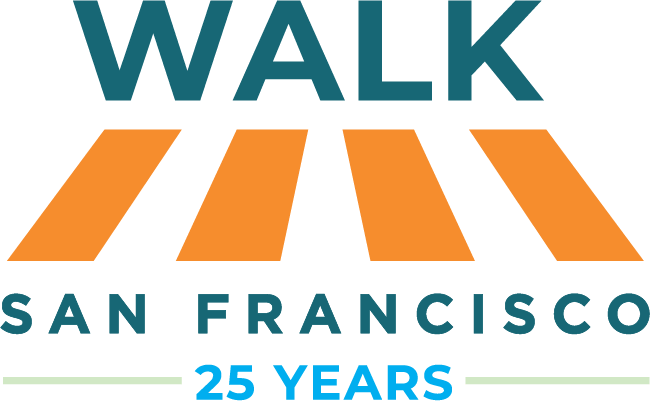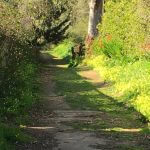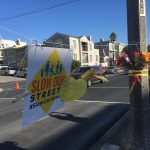Three state bills for pedestrians we must pass
California state legislators have put forward bills that would make big steps toward better protecting pedestrians if passed: AB 550, AB 1238, and AB 43. Walk SF is doing everything in our power to help pass these three bills, including sponsoring AB 550. Get all the details on these bills below.
Hearings will start around mid-April for these bills. By that time, we need lots of letters of support already submitted.
If you’re part of a neighborhood, community-based, or civic organization that wants to back these bills, learn how to make your support official below.
AB 550: Speed Safety System Pilot Program
San Francisco needs to be able to use every possible proven tool to better protect communities and save lives. Speed is the #1 cause of severe and fatal crashes. Speed safety enforcement systems dramatically shift behavior and can reduce the number of severe and fatal crashes by as much as 58%. More than 100 communities in the United States have already embraced speed detection technology.
- Passing AB 550 means that California cities can finally pilot speed safety enforcement systems on the busiest streets with the highest crash rates.
Read the bill text and fact sheet. Then download a sample support letter. NOTE: San Francisco-based groups are invited to sign onto the Vision Zero Coalition letter.
After finishing your support letter, submit it via the state legislature’s portal.
AB 43: Setting Speed Limits to Enhance Traffic Safety
Other leading Vision Zero cities are showing the power of reduced speed limits, both in bringing down average speeds and especially high-risk speeds. There are many streets here in San Francisco that should have lower speed limits, but the City is unable to change them. Maddeningly, current California law requires speed limits to be set based on how fast most drivers are going, not on what’s needed to keep people safe.
- Passing AB 43 would give cities greater freedom to set speed limits based on safety. It would require traffic surveyors to take the presence of vulnerable groups, including children, seniors, the unhoused, and people with disabilities when setting speed limits. It would also let cities set lower speed limits than traditionally allowed on those streets with the highest crash rates.
Read the bill text and fact sheet. Then download a sample support letter. NOTE: San Francisco-based groups are invited to sign onto the Vision Zero Coalition letter.
After finishing your support letter, submit it via the state legislature’s portal.
AB 1238: The Freedom To Walk Act
When enforced, jaywalking tickets are disproportionately given to people of color, and these encounters with police can turn life-threatening. There is no evidence that jaywalking laws make streets safer, especially for the most vulnerable pedestrians: children and seniors.
The concept of “jaywalking” is fundamentally flawed and devalues people walking (this article provides a lot of food for thought; who are jaywalking laws really serving?). Those limited resources for traffic enforcement should focus on reckless and deadly driving behavior, not ticketing pedestrians.
- Passing AB 1238 would decriminalize jaywalking in California by legalizing crossings, when safe, outside of a crosswalk or against a traffic light.
Read the bill text and press release. Calbike, one of the bill’s sponsors, provides more information here. Then download a sample support letter. NOTE: San Francisco-based groups are invited to sign onto the Vision Zero Coalition letter.
After finishing your support letter, submit it via the state legislature’s portal.
How you can support these three bills as an individual
Pushing for state legislation is a big undertaking for a small organization like Walk SF. We need to bring on additional staff to build statewide support and boost our presence in Sacramento. Please chip in now if you want to pass AB 550, AB 1238, and AB 43!
Contact Brian if you have questions about your organization supporting any of these bills.
Banner image: Mathieu Thouvenin via Flickr Creative Commons




